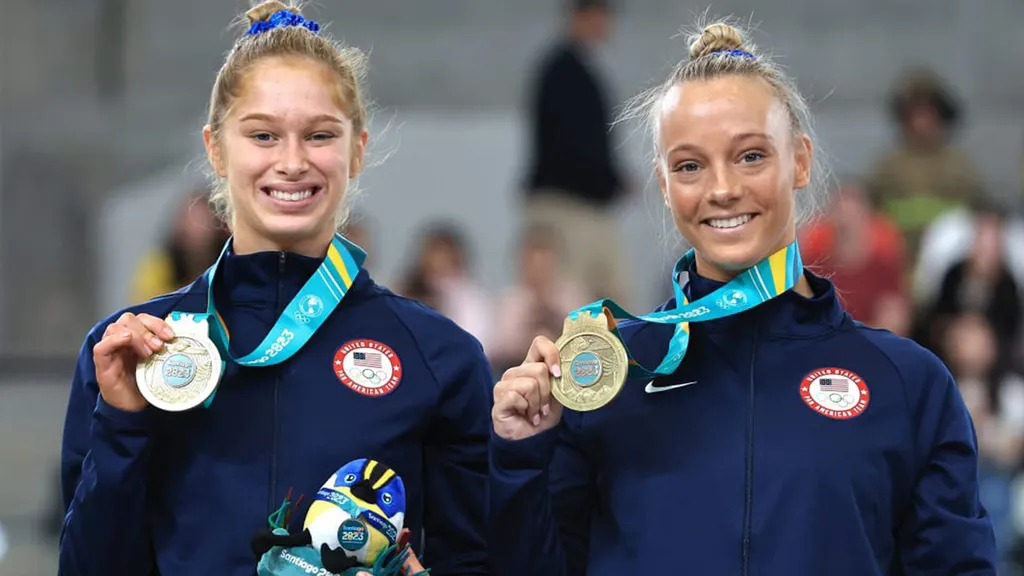- November 09, 2023
- By Karen Shih ’09
Editor's Note: Jessica Stevens was selected to represent the United States at the 2024 Olympic Games at the U.S. Gymnastics Championships in late June. She placed 13th in the qualification round.
Jessica Stevens ’24 starts out steadily. One bounce. Two. Three. Then suddenly, she rockets into a triple flip, two stories in the air, and springs back up into a dizzying series of tucks and twists, forward and backward, like Tigger unleashed—but with perfectly pointed toes.
This isn’t playtime on a backyard trampoline. The University of Maryland senior is one of the world’s top athletes in trampoline gymnastics. She won a bronze medal at the world championships in November—the first American in half a century to earn a podium spot—and qualified the United States for a berth at the 2024 Olympic Games in Paris.
“I still can’t believe it,” she says. “I go back and watch my videos, and I’m like, ‘Wait a second—that was me!’”
Trampoline gymnastics, an Olympic event since 2000, is a separate discipline from better-known, Simone Biles-dominated artistic gymnastics (which includes balance beam, uneven bars, vault and a floor routine). Trampoline athletes are judged on how well they can execute 10 skills during a roughly one-minute routine as they reach heights of 15 feet or more, flipping and twisting while trying to stay centered.
“I love the feeling of flying,” said Stevens. “It’s so peaceful up in the air.”
[Skating to Success: Ice Dancer Aims to Medal at National Championships]
She started in gymnastics as part of “Mommy and Me” classes as just a toddler, and as a little kid, quickly realized her favorite part was jumping on the trampoline. By the time she was 13, she qualified for the national team, and by 17, she had reached the highest level of the sport and competed at the world championships in Bulgaria for the first time.
There, two-time Olympic gold medalist Rosie MacLennan of Canada approached Stevens and said, “Hi, you must be Jessica!”
“I was like, ‘Oh my god, she’s talking to me.’ She’s such a legend in the sport. It really hit me that I was competing among the best,” Stevens said.
Her schedule is relentless. The U.S. competition circuit runs from February through June, and international competitions dot the year, so she rarely has downtime. She starts her day at 7:30, juggling in-person and online classes with two training sessions at the Fairland Sports and Aquatics Complex in Laurel, Md., where she works on her trampoline skills as well as strengthening her core and other conditioning. Despite the demands of the sport, she decided not to delay higher education so she could set herself up for the future.

“There’s the day when my body is going to say. ‘I’m not so sure about this anymore,’” she said.
Stevens earned an associate’s degree at Howard Community College, then enrolled at UMD in Fall 2022 as a criminology and criminal justice (CCJS) major and Russian studies minor, hoping to pursue a career in the legal field. Her professors have been a “godsend” in understanding her complicated schedule, and have made it easy for her to incorporate her studies into her travels.
For example, she’s pursuing an independent study with CCJS Lecturer Alan Lehman about cannabis around the world. Competing in places as far-flung as Azerbaijan, Mexico and Portugal this year, she’s able to interview people on the ground about their knowledge and experiences with marijuana laws.
And her beginner Russian skills are already giving her a leg up in her training. Her coach, Konstantin Gulisashvili ’19, M.Arch. ’23, is from the Republic of Georgia, a former member of the Soviet Union, so when she visited his homeland for a training bloc earlier this year, she was finally able to communicate with other experienced coaches and trainers who spoke no English.
“I started out not even being able to say hello to them, and now they can tell me to jump higher, work on certain things—even offer me tea. It was a great experience,” she said. She credits the “small, close-knit” Russian department in the School of Languages, Literatures, and Cultures, especially Maya Brin Distinguished Lecturer Zhanna R. Gerus-Vernola and lecturer Inna Hardman, for giving her the confidence to communicate, even if her grammar is imperfect.
Gulisashvili says her work ethic, both in class and at the gym, sets her apart. And as the youngest finalist at worlds, she has a “very bright future” in the sport, he says. “I don’t think she’s at her peak.”
This spring, Stevens competed at two Olympic trials and has one more in June, where she’ll find out if she’s been selected to represent the U.S. in July. She’s grateful for the support of the U.S. Olympic Committee, which flew her out to the Colorado Springs Olympic and Paralympic Training Center and has given her access to top sports medicine doctors who can treat aches and injuries that stump regular physicians.
“I’m really proud of where I am right now,” Stevens says. “I really want to get to the Olympics, but you also have to enjoy the journey.”
Check out Stevens' routine at last year's world championships, where she placed 6th:
